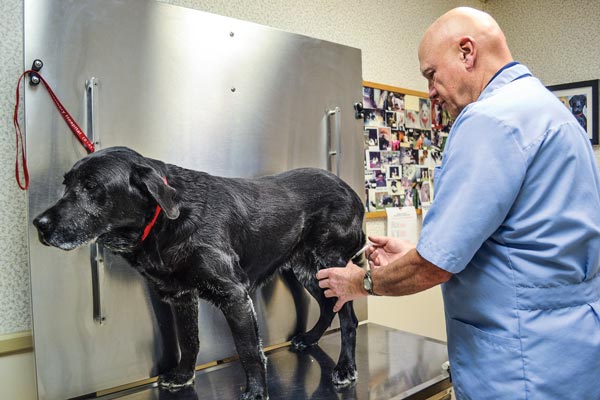April 08, 2015
By Kyle Wintersteen
 Lyme disease is a painful affliction warranting preventative measures that much all veterinarians agree on. Lyme vaccination is another story. Case in point: Two of America's most prestigious veterinary institutions, the University of Pennsylvania and Cornell, are at odds on the issue.
Lyme disease is a painful affliction warranting preventative measures that much all veterinarians agree on. Lyme vaccination is another story. Case in point: Two of America's most prestigious veterinary institutions, the University of Pennsylvania and Cornell, are at odds on the issue.
"It's definitely a controversial subject," says Dr. Gregg Campbell, a retriever expert and veterinarian at the Animal Care Center in Danville, Pa.
Penn argues Lyme is easily treated with antibiotics making vaccination unnecessary. In rare cases (less than 1 percent) the Lyme vaccine causes an autoimmune response resulting in kidney disease; retrievers are among the more susceptible breeds. So why risk it?
Because, says Cornell, the potential damage posed by Lyme including severe arthritic-like symptoms and rarely renal failure outweighs the minimal odds of vaccine side effects. Worse, it's easy for the disease to progress, argue vaccine proponents, as 85 percent of infected dogs display no clinical symptoms.
Advertisement
Given the disagreement, how are retriever owners to decide?
Lyme is rather easily treated with antibiotics, typically Doxycycline. However, hardy retrievers tend to mask discomfort much better than your average pooch. In my experience (and I've had several dogs contract Lyme), the earliest indication is a loss of scenting ability. If you lack confidence in your ability to spot Lyme in the early stages, the vaccine warrants contemplation.
"Five years ago I didn't vaccinate for Lyme," says Campbell. "But now I recommend it because we're seeing so many cases (in Pennsylvania). For hunting dogs, I'd vaccinate."
Advertisement
Owners in especially Lyme-prone areas (eastern states from Virginia to Maine, the upper Midwest and Great Lakes regions, and the northwestern U.S.) should consider vaccination.
 The Lyme vaccine requires an initial injection, a booster weeks later, and annual boosters thereafter at about $30 a pop. It's a minimal investment, but the vaccine does carry a failure rate of about nine percent according to the pharmaceutical companies. Still, provided proof of infection, some vaccine-makers will reimburse owners of infected dogs for the cost of the vaccine and antibiotics.
The Lyme vaccine requires an initial injection, a booster weeks later, and annual boosters thereafter at about $30 a pop. It's a minimal investment, but the vaccine does carry a failure rate of about nine percent according to the pharmaceutical companies. Still, provided proof of infection, some vaccine-makers will reimburse owners of infected dogs for the cost of the vaccine and antibiotics.
Unlike regular vaccines which build immunity through anti-body production the Lyme vaccine essentially attacks the tick itself. It circulates a protein within the canine system that kills Lyme amongst invading ticks.
Whether you choose to vaccinate or not for the record, I do veterinarians are in agreement that a monthly flea and tick treatment should be applied. This helps prevent Lyme, of course, and also sundry other tick-transmitted diseases.
"Topical treatments are definitely more important than vaccination," advises Campbell. "Some of the newer products kill ticks in a matter of hours, whereas it's believed that a tick has to be on a dog 48 hours to cause Lyme."
But can't exposure to water simply wash off the treatments?
"They claim to be waterproof, but if your dog is swimming a lot it's absolutely diluting the treatment," Campbell explains. "Personally, I'd treat your retriever every three weeks if he'll be swimming, especially from September to November when ticks are really looking for warm bodies."
Unfortunately, those are, of course, waterfowling months. Whether you choose to vaccinate or not, we owe it to our duck dogs to take Lyme prevention seriously.

